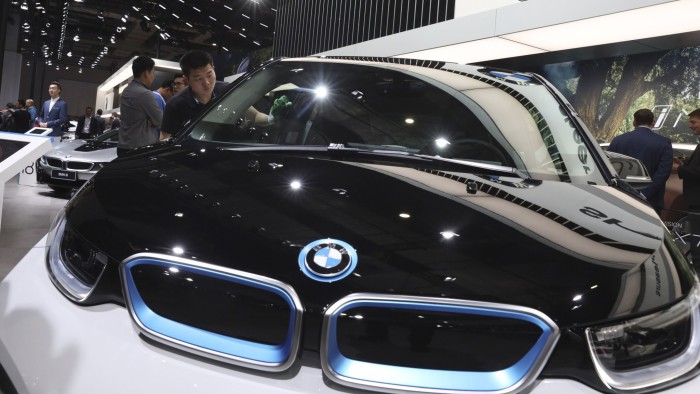Jaguar Land Rover and BMW to collaborate on electric vehicles

Simply sign up to the Electric vehicles myFT Digest -- delivered directly to your inbox.
Jaguar Land Rover and BMW will work together to develop electric-vehicle technology, the latest collaboration as rival carmakers across the world seek to spread their investment costs.
The two companies will jointly work on electric drive units, which transfer power from batteries to the wheels, and pool some research and development resources and purchasing.
Both companies are seeking to cut costs to counter the squeeze on their current businesses from falling sales and trade costs, while also trying to invest in technologies needed for the future, such as electric cars.
Carmakers are being forced to invest in electric cars to meet tightening CO2 rules in Europe and electric sales mandates in China, piling additional pressure on motor groups at a time of falling sales and waning profits in their major markets.
JLR is cutting 4,500 jobs as part of a £2.5bn savings programme, while BMW is trying to save €12bn after warning that profits will be “well below” last year’s levels.
While there are few specifics about which current technologies will be shared, both have experience in the field.
BMW, which is about five times the size of JLR, was one of the first major manufacturers to release a fully electric car, launching the i3 in 2013, and has a wide range of plug-in hybrid vehicles.
JLR, which has developed the award-winning Jaguar I-Pace battery car, also has its own hybrid technology.
The companies plan to manufacture the jointly developed parts in their respective plants.
JLR expects to make its electric drive units at its Wolverhampton engine plant, in time using batteries from its new Hams Hall battery facility. The I-Pace is currently made in Austria by a contract manufacturer, Magna Steyr.
“It was clear from discussions with BMW Group that both companies’ requirements for next-generation electric-drive units to support this transition have significant overlap making for a mutually beneficial collaboration,” said Nick Rogers, JLR engineering director.
“The pace of change and consumer interest in electrified vehicles is gathering real momentum and it’s essential we work across industry to advance the technologies required to deliver this exciting future.”
In a motor industry dominated by giants, JLR and BMW are subscale players, with combined sales of just over 3m cars annually.
Carmakers of all sizes are pooling resources or seeking scale to try and increase their chances of survival as the sector tilts towards electric vehicles.
Fiat Chrysler is seeking to merge with Renault to lower its development costs, while Volkswagen and Hyundai are both seeking buyers for their respective battery electric and hydrogen fuel cell technologies.
VW already has a global alliance with Ford to work together on new vehicles and projects.
Ralf Speth, JLR’s chief executive, told the Financial Times’s Future of the Car summit last month that the company faced rising battery costs for the I-Pace because of high demand as carmakers rolled out an ever increasing number of electric vehicles, putting pressure on battery suppliers.
“The supply of batteries is at the moment very limited,” he said. “And that means also that for the next, let’s say two or three years we don’t see a cost reduction of batteries. I expect that the cost of batteries is going up.”
However, amid reports of a possible tie-up with Peugeot owner PSA, he also stressed that the company did not need additional scale or larger collaborations to survive, saying that “being small, being nimble is also an opportunity to be agile”.
Comments